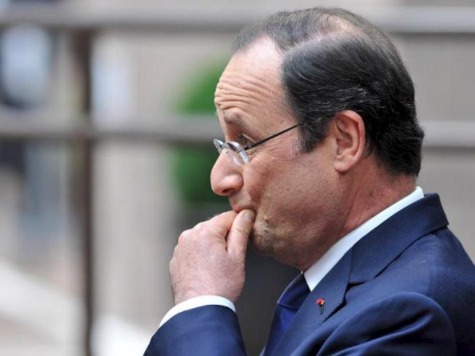A political backlash against both parties has created a strong Tea Party movement in France that is rocking the country’s political landscape. Socialist President François Hollande’s failed economic policies and hard-left social policies are angering those who had never before participated in politics.
Tea Party, à la Française? The answer seems to be, oui oui.
As The Washington Post notes, those in the working-class populist movement have lashed out against the stale institutional left and right. Parisian mothers and factory workers who have never before been active in politics are getting involved in politics for the first time at the local and national levels. That is why some analysts are comparing them to the so-called Reagan Democrats of the 1980s.
Some want to paint the French tea partiers as a fringe group. The Post reports that “the movement’s strength in numbers, however, cannot be ignored.”
“Initially a reaction to a same-sex marriage law passed last year, the movement has morphed into the most sustained mobilization of social conservatives here in more than a generation,” the Post notes. “Tens of thousands of people are taking to the streets in repeated protests, many for the first time in their lives. They are organizing assemblies and social-media campaigns even as some angry newcomers run against incumbents on the right whom they consider not socially conservative enough.”
The movement first formed to oppose same-sex marriage and intensified after “scores of social conservatives took their children out of public schools for one day in January.” They did so “to protest new lessons being tested in some French schools aimed at dispelling gender stereotypes.” Critics asserted that those lessons could lead to other lessons where boys wear dresses and girls play mechanic and even “masturbation classes for children.”
As Breitbart News noted, European Tea Party movements are on the march across the continent, largely in response to failed policies from their leaders and the unaccountable European Union bureaucrats in Brussels. In addition, the continent “already hit by economic upheaval is confronting a wave of bitter” opposition from people who are fed up with “issues such as euthanasia, abortion and same-sex marriage” being forced on them.
The Post mentions that pro-life forces are rising up in Spain, conservatives in Poland opposed a proposal to allow same-sex civil partnerships, and German Chancellor Angela Merkel expressed doubts about “full adoption rights for same-sex couples.”
Though disparate, “the movement is politicizing a new class of conservatives — many of them religious — who were previously under the radar, leading to challenges for politicians on the right who have veered too close to the center.”
“The movement also is beginning to gain a perch in the center-right UMP of former President Nicolas Sarkozy, with social conservatives forming Common Sense, a new movement within the party that is pushing ‘traditional family values.'”
They are more liberal economically than the Tea Party in the United States, but those involved in the protest movements in France have seen many similarities nonetheless. “In a way, yes, on values, I think we could be described as a kind of tea party.” The protesters want more accountability from bureaucrats and politicians and have railed against the cronyism and mismanagement of the economy.
In France, there are no primaries that the so-called tea partiers can take advantage of like in the United States, but that has not stopped the French tea partiers from already making an impact.
“I voted for Hollande, but never again will I vote Socialist,” a factory worker who “kept his four children home from elementary school for that day in January to protest new lessons” told the Post. “They are backing policies that are affecting our children. I now understand that they have betrayed us.”
And sure enough, on Sunday, the conservative National Front scored “its biggest victory ever, taking 11 towns and a major district in Marseille in part by appealing to outraged residents.” It also forced the left to cede “more than 150 other cities to the center-right Union for a Popular Movement (UMP).”
After Hollande’s socialist party got routed in those elections, he was forced to make “Interior Minister Manuel Valls his new prime minister, replacing Jean-Marc Ayrault, who, with other ministers, took the blame for the Socialists’ defeat in local elections.” Valls immediately recognized the brewing political movement.
“We are witnessing the rise of a tea party of the French,” Valls warned in a prominent French newspaper.
As the Post points out, Sunday’s election results may suggest even bigger success to come, as conservatives “may be on track to make record gains in elections for the European Parliament in May.”

COMMENTS
Please let us know if you're having issues with commenting.